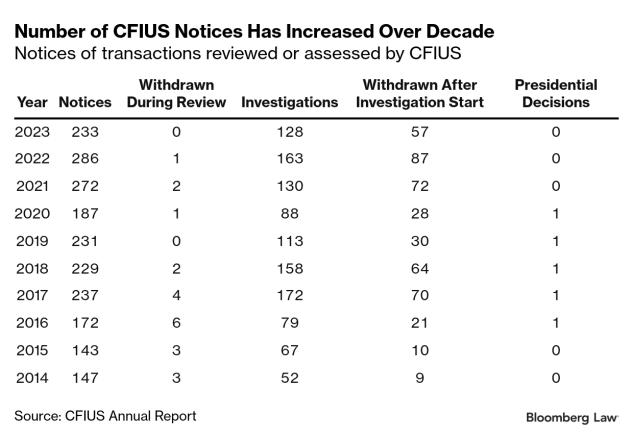- Less risk analysis speeds up CFIUS’ national security review process
- Mitigation can cost companies millions in compliance costs
As deals activity rises, Big Law M&A practitioners see another reason for optimism with the Trump administration easing the path for transactions with national security implications.
President Donald Trump’s America First Investment Policy has lowered stipulations employed by the Committee on Foreign Investment in the United States to assess security risks for deals with a foreign component.
“I see transactions move forward now, while a year or two ago CFIUS might have slapped on an onerous mitigation agreement—because they could,” said Rick Sofield, co-head of Debevoise & Plimpton’s national security group. “Deals have cleared without mitigation” this year.
Lawyers view the recent rise in mergers and acquisitions as more than just a temporary blip after two years of stagnation brought on by economic, regulatory and geopolitical uncertainty. Global deal volumes of completed or pending transactions hit approximately $1.4 trillion in the first half of the year, up 18.5% from the same period in 2024, according to Bloomberg league tables released Tuesday.
Latham & Watkins was Big Law’s leading M&A adviser for the first half of the year with about $269 billion in deals. Kirkland & Ellis and Wachtell Lipton Rosen & Katz followed.
Transactions that have a foreign connection often undergo reviews by the Treasury Department-led CFIUS, as required by the 1950 Defense Production Act. Companies notified CFIUS of 233 transactions in 2023—half of them in finance, information and services—down from a 10-year high of 286 in 2022, according to the committee’s most recent annual report to Congress.
The committee can wave a plan forward or block it—or it can require extra steps, which the panel refers to as mitigation, to ensure security needs are met. “We’ve seen CFIUS heavily mitigate transactions, especially related to sensitive personal data, even when the foreign investor is not a threat over recent years,” Sofield said. “Some companies have millions of dollars in compliance costs.”
CFIUS in 2023 concluded actions after requiring mitigation on 35 transactions, according to the committee’s report to Congress. In 2020, the final year of the first Trump administration, CFIUS ordered mitigation on 16 transactions, the panel’s 2021 report to Congress showed.
For companies undergoing reviews, mitigation meant delays.
“In previous administrations until now, if there was any mitigation, it was almost never ever completed within the statutory timeline,” said Michael Leiter, who heads Skadden, Arps, Slate, Meagher & Flom’s CFIUS and national security practices. “Every time there was mitigation, it required at least a 45-day, or 90-day, if not longer, extension. That’s where you start having real issues with deals.”
Still, it’s too early in the Trump administration to know for certain whether the faster pace of deal reviews will continue, he said. “You really need to have a much higher volume of matters that pose challenging circumstances to know whether or not the mitigation levels have dropped,” Leiter said.
Faster Process
The new administration’s commitment to speeding up reviews has included “trying to signal to the parties earlier in the process” whether they will be able clear the transaction or meet a deadline, said Christine Laciak, a special counsel at Freshfields who guides clients through CFIUS. “We have seen some improvements in terms of the overall process and timeline.”
High profile cases have already moved through CFIUS under Trump. In June, the president issued an executive order to permit Nippon Steel Corp.'s investment in United States Steel Corp., after the US government and companies reached a security agreement.
In March, AI chip builder Cerebras Systems Inc. said it had resolved “all open issues” with CFIUS, a key step in moving toward its initial public offering.
One big transaction still hasn’t moved forward. Trump in 2020 issued an executive order directing ByteDance Ltd., the Chinese owner of short-form video app TikTok, to divest its US assets after a CFIUS review. He claims he has identified a buyer for the app.
The absence so far of mid-level Trump political appointees give practitioners optimism that deals will continue moving through the pipeline. That’s because there are fewer people in a position to intervene. Trump just last month nominated Chris Pilkerton, the acting leader of the Small Business Administration during the president’s first term, to oversee CFIUS within Treasury.
“When you have fewer hurdles to jump over in any transaction, then you obviously end up with a smoother and quicker process with fewer boxes to check,” Laciak said.
Said Leiter: “There’s a big gap of people in the middle, who aren’t there or are in an acting capacity. Until those mid-level politicians get into place, it’s natural that you’re not going to see major shifts or development in how the committee is operating.”
To contact the reporter on this story:
To contact the editors responsible for this story:
Learn more about Bloomberg Law or Log In to keep reading:
See Breaking News in Context
Bloomberg Law provides trusted coverage of current events enhanced with legal analysis.
Already a subscriber?
Log in to keep reading or access research tools and resources.



